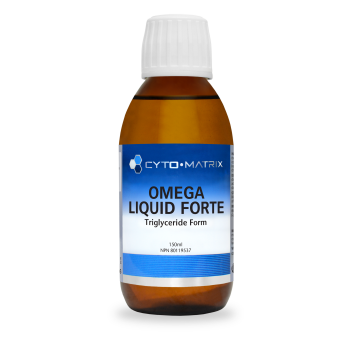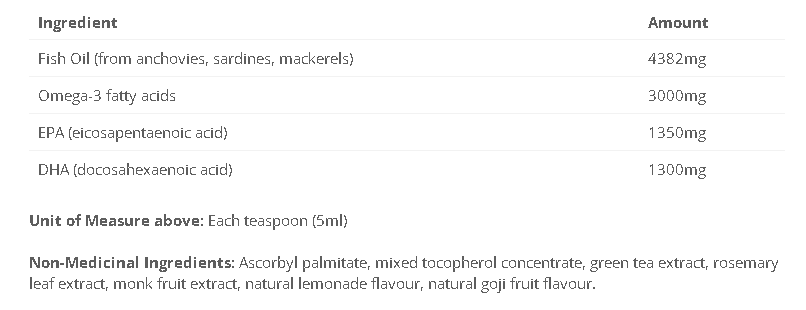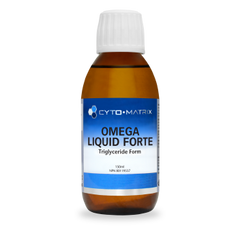



Omega Liquid Forte
- 81.99$
0.00$- 81.99$
- Unit price
- per
Description
x- Each teaspoon provides a balanced blend of 1350 mg of EPA and 1300 mg of DHA, sourced from sardines, anchovies and mackerel, in their native and highly bioavailable triglyceride form.
- Indicated for general support of cell membranes and inflammatory pathways, cardiovascular function, balanced immunity, cognition, mental health, skin health and atopic problems.
- Stabilized with a proprietary antioxidant blend of non-GMO mixed tocopherols, green tea extract, rosemary, and vitamin C.
- iFOS (International Fish Oil Standards) certified to meet the highest quality standards and ensure optimal stability, potency and purity.
- Each 150ml bottle contains 30 servings in a natural lemonade and goji berry flavored liquid.
The modern diet has seen a drastic reduction in omega-3 fatty acid intake, compounded by a significantly higher intake of omega-6 fatty acids. This is problematic because many of our tissues rely on fatty acids for their synthesis and communication. If the appropriate fatty acids are not available, the implications for overall health are far-reaching. Ultimately, a relative deficiency in omega-3 fatty acids can lead to a pro-inflammatory state and increase the risk of chronic disease.
The active compounds responsible for the widespread benefits of fish oil supplementation have been identified as eicosapentaenoic acid (EPA) and docosahexaenoic acid (DHA). While both are important for various aspects of human health, EPA is generally considered the anti-inflammatory fatty acid, while DHA is more responsible for neurological development and nerve protection.
EPA and DHA have been clinically studied for a variety of health conditions. For example, omega-3 fatty acid supplementation has been shown to benefit cardiovascular health, rheumatoid arthritis, autoimmunity, cognition, mood, skin health, and atopic conditions, to name a few clinical indications. In other words, EPA and DHA should be considered for any systemic inflammatory condition and to support the nervous system.
One of the challenges with omega-3 supplementation is poor compliance. Most supplements require a large number of capsules or teaspoons per day to obtain an evidence-based dose of combined EPA and DHA. Cyto-Matrix Omega Liquid Forte solves this problem by providing 1350 mg of EPA and 1300 mg of DHA in a single teaspoon, sourced from sardines, anchovies, and mackerel. These omega-3 fatty acids are provided in their native, highly bioavailable triglyceride form.
Omega Liquid Forte is also iFOS (International Fish Oil Standards) certified to meet the highest quality standards and ensure optimal stability, potency, and purity. iFOS certification standards even exceed internationally recognized levels set by regulatory bodies and major trade organizations, such as the Council for Responsible Nutrition and the World Health Organization.
Produits recommandés
Produits récemment consultés
- Choosing a selection results in a full page refresh.



